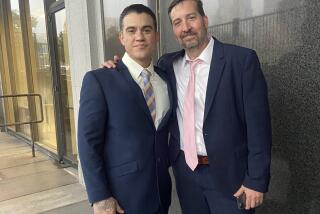Convict Held in Stabbing Death of San Diego Girl, 12
- Share via
SAN DIEGO — A 33-year-old mentally unstable drug user and petty criminal was arrested Wednesday for allegedly killing a 12-year-old girl in her bed in suburban Escondido in January 1998.
The slaying of Stephanie Ann Crowe has invited comparisons with the mystery surrounding the death of JonBenet Ramsey in Boulder, Colo. In both cases, a young girl was killed at night in her home, a member of the family came under suspicion and the family insisted the killer was an intruder even though police could find no evidence of forced entry.
In the weeks after the Crowe killing, the district attorney’s office charged Stephanie’s brother and two of his friends in the stabbing death.
But charges were dropped on the eve of trial when three specks of Stephanie’s blood were found on the filthy sweatshirt of Richard Tuite, a transient who was prowling the rural neighborhood knocking on doors the night Stephanie was killed. An earlier forensic test had failed to detect the blood and police thought Tuite too clumsy and confused to have entered the home without leaving any evidence behind.
Amid civil lawsuits by the three teenagers’ parents accusing prosecutors and Escondido and Oceanside police officers of violating the teens’ rights, the murder investigation was transferred in late 1999 to the state attorney general’s office and the San Diego County Sheriff’s Department.
After a 30-month investigation, Atty. Gen. Bill Lockyer and San Diego County Sheriff Bill Kolender announced Wednesday that Tuite had been arrested in the slaying. Tuite was set to be released from state prison Friday after serving a sentence for an unrelated burglary conviction.
Lockyer and Kolender conceded that winning a conviction will be difficult. “There is still a lot of work to do,” Kolender said.
Lockyer and the prosecutor assigned to the case, Special Assistant Atty. Gen. David Druliner, declined to say whether the investigation had uncovered any evidence against Tuite beyond the three specks of blood--specks that Tuite’s attorney has long asserted were the result of sloppy handling of evidence by police.
The prosecution, Lockyer and Druliner said, will face the daunting task of explaining to jurors why the evidence that led a county grand jury to indict the three teenagers was flawed.
The evidence that led to indictments of Michael Crowe, Joshua Treadway and Aaron Houser included incriminating statements by Houser and Crowe, a confession by Treadway, testimony from a forensics expert that a knife owned by Houser and found under Treadway’s bed was “consistent” with the nine wounds on Stephanie’s body and assertions by police that there was no evidence that anyone had broken into the home.
All three teens have claimed that police coerced them into making false statements. And an expert witness for the defense was prepared to assert that Houser’s knife could not have been the murder weapon.
If Tuite stands trial, prosecutors and police from the initial case could be called, in effect, as defense witnesses to reject allegations by the attorney general’s office that their investigation was botched.
Asked specifically about Treadway’s confession, Lockyer said, “Yes, that’s a complicating factor. The state will have to put on evidence of the original theory [by the district attorney] and show why that was faulty.”
San Diego attorney Edward Peckham, who has represented Tuite, immediately accused the Sheriff’s Department and attorney general’s office of trying to pin the case on a mentally ill convict who has little support in the community.
He also criticized deputies and investigators for interrogating Tuite for several hours this week without an attorney present. Months ago, Peckham said, he asked prison officials to keep police from interrogating Tuite, asserting that as a diagnosed paranoid-schizophrenic Tuite is mentally incompetent to waive his right to have a lawyer present during questioning.
Druliner, on the other hand, said that Tuite did not appear mentally ill during the interrogation.
Tuite has repeatedly denied killing Stephanie or attempting to break into the Crowe home.
He has served time in prison for burglary, auto theft and drug use.
In an affidavit in support of the arrest, Sheriff’s Deputy Victor Caloca noted that Tuite, in 1993 and 1996, was alleged to have carried a knife. Caloca also concluded that statements by the teenagers were false and were made under emotional duress.
“I’m delighted we were able to bring some peace” to the Crowe family, which has long accused Tuite of the crime, Lockyer said.
Peckham said Lockyer’s office will find that the evidence amassed against the three teenagers, at the very least, provides reasonable doubt about Tuite’s guilt. “This will be hotly litigated,” he said.
More to Read
Sign up for Essential California
The most important California stories and recommendations in your inbox every morning.
You may occasionally receive promotional content from the Los Angeles Times.













